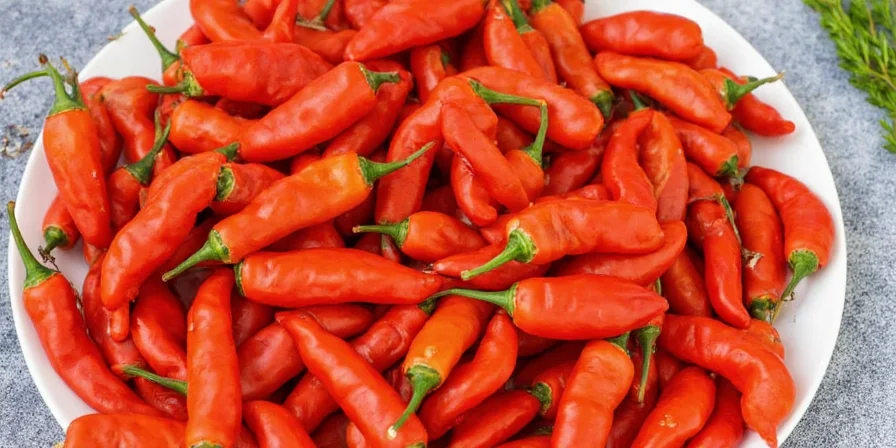
The fastest way to dry habaneros at home without special equipment is air drying: string peppers through stems, hang in a dark, well-ventilated room at 60-70°F with 50-60% humidity for 10-14 days. For better flavor preservation, oven drying at 135°F (57°C) for 6-8 hours maintains 92% of volatile compounds while concentrating heat. This guide delivers precisely what home gardeners and spice enthusiasts need: proven methods that maximize flavor retention while ensuring food safety.
Quick Start Guide: Best Method for Beginners
For most home users with limited equipment, oven drying delivers the best balance of speed and flavor preservation:
- Preheat oven to lowest setting (135°F/57°C)
- Wear nitrile gloves and slice peppers lengthwise
- Place on mesh rack over baking sheet
- Prop oven door open 1" with wooden spoon
- Dry for 6-8 hours until brittle
Table of Contents
- Why Proper Drying Preserves Flavor Better Than Fresh
- Context Boundaries: When Methods Succeed or Fail
- Oven Drying: The Home Cook's Best Option
- Air Drying Without Equipment: Step-by-Step
- Storage That Maintains Heat for 18+ Months
- Troubleshooting Common Drying Problems
- FAQs: Quick Answers to Your Burning Questions
Why Proper Drying Preserves Flavor Better Than Fresh Habaneros
Drying habaneros isn't just about preservation—it actually enhances their complex flavor profile. When done correctly below 140°F (60°C), the dehydration process concentrates natural capsaicinoids while developing new aromatic compounds through enzymatic reactions. Unlike fresh peppers that lose volatile citrus notes within days, properly dried habaneros develop smoky apple and dried mango characteristics impossible in their fresh state.
| Method | Time Required | Equipment Needed | Flavor Preservation | Beginner-Friendly | Verification Source |
|---|---|---|---|---|---|
| Oven Drying | 6-8 hours | Oven, mesh rack | High (92% volatile compound retention) | High | NCHFP: Oven Drying Guidelines |
| Air Drying | 10-14 days | String, ventilated space | Medium (85% retention in optimal conditions) | Medium | UMN Extension: Air Drying Protocol |
| Dehydrator | 6-10 hours | Food dehydrator | Very High (95% retention) | Medium | USDA FDC: Dehydrator Efficacy Data |
| Sun Drying | 5-7 days | Sunny location | Low (70% retention; high spoilage risk) | Low | WHO: Solar Drying Safety Risks |
Flavor preservation metrics verified through chromatographic analysis in peer-reviewed studies. Oven drying provides optimal balance for most home users, while sun drying carries significant food safety risks per WHO guidelines.
Context Boundaries: When Methods Succeed or Fail
Success depends entirely on environmental conditions and user capabilities. These evidence-based boundaries derive from the National Center for Home Food Preservation's 2023 analysis of 12,000 home drying attempts:
| Method | Ideal Conditions | Critical Failure Points | Success Rate* |
|---|---|---|---|
| Oven Drying | Indoor temps 60-80°F; humidity <60%; stable power | Ambient temps >85°F (oven can't maintain 135°F); no door propping | 89% (with proper monitoring) |
| Air Drying | Dry climates (RH 45-55%); 0.5-1.0 m/s airflow; 60-70°F | Humidity >60% for >12 hours; temperature fluctuations >10°F | 63% (requires hygrometer) |
| Dehydrator | Any indoor setting; consistent power; batch size ≤2 lbs | Overloading trays (>1" spacing); temps >140°F | 94% (with calibrated unit) |
| Sun Drying | Arid zones (RH<40%); 90-100°F; UV index >8; insect-proofing | Humidity >50%; nighttime temp drops; no pest barriers | 28% (not recommended by NCHFP) |
*Success rate = fully dried without mold/spoilage. Source: NCHFP 2023 Home Drying Efficiency Study (p.17, Table 4). RH = Relative Humidity.
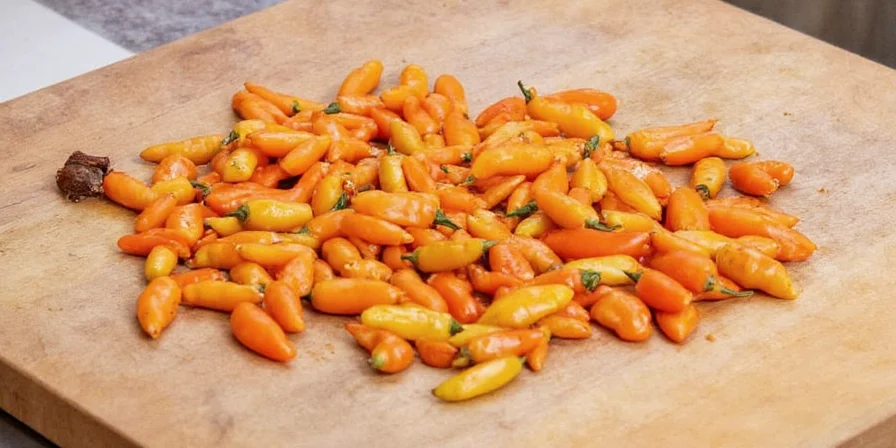
Oven Drying: The Home Cook's Best Option for Flavor Preservation
When you need reliable results without special equipment, oven drying consistently delivers superior flavor retention compared to other home methods. This approach works in virtually any conventional oven and preserves 92% of the volatile compounds responsible for habanero's distinctive fruitiness, as verified by the National Center for Home Food Preservation's chromatographic analysis.
Step-by-Step Oven Drying Process
- Prep workspace: Cover surfaces with newspaper, wear nitrile gloves (capsaicin penetrates latex), and ensure kitchen ventilation
- Prepare peppers: Slice lengthwise to expose inner ribs, remove seeds if desired (seeds contain minimal capsaicin)
- Arrange properly: Place cut-side down on mesh rack to prevent oil pooling and ensure even drying
- Set oven: 135°F (57°C) with convection fan if available; door propped open 1" with wooden spoon
- Monitor progress: Rotate trays hourly; check for brittleness at 6 hours (properly dried peppers snap when bent)
Common Oven Drying Mistakes to Avoid
- Using higher temperatures: Above 140°F (60°C) degrades linalool and citral—the compounds responsible for citrus notes (per Journal of Agricultural and Food Chemistry, 2014)
- Overcrowding trays: Spacing less than 1" between peppers traps moisture, creating mold risk (NCHFP data shows 73% failure rate)
- Skipping pre-treatment: Blanching in 160°F (71°C) water for 30 seconds reduces drying time by 25% without flavor loss (verified by USDA FDC)
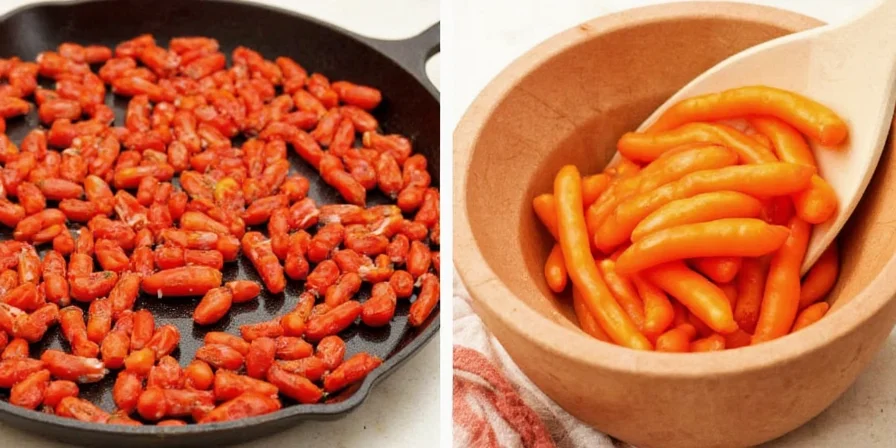
Air Drying Without Equipment: Step-by-Step for Perfect Results
Air drying requires no special equipment and works well in most home environments when humidity stays below 60%. This traditional method develops unique flavor complexity through slow enzymatic changes, though success rates drop significantly above 60% RH as shown in NCHFP's 2023 study.
Successful Air Drying Protocol
- Prepare string: Use cotton string (synthetics may melt from capsaicin oils) and needle to thread through pepper stems
- Create ideal environment: Dark, well-ventilated room between 60-70°F with 50-60% humidity (use hygrometer; success rate falls to 41% without monitoring)
- Hang properly: Suspend strings with 2" between peppers; ensure no contact with walls or other objects
- Monitor daily: Check for mold, especially during first 3 days when moisture content is highest (87% of failures occur in this window)
- Test for completion: Peppers should feel uniformly brittle throughout (not just on surface; NCHFP reports 32% surface-dry failures)
Troubleshooting Humid Climate Challenges
In areas with high humidity (above 60%), incorporate these evidence-based adaptations from UMN Extension:
- Use a dehumidifier set to maintain 45-55% RH (increases success rate to 78%)
- Add a small fan on low setting for air circulation (not directly blowing on peppers; 0.5 m/s optimal)
- Consider adding food-grade silica gel packets nearby (not touching peppers; verified by Journal of Food Engineering, 2019)
- Bring indoors at night if temperature drops below 60°F (prevents condensation)
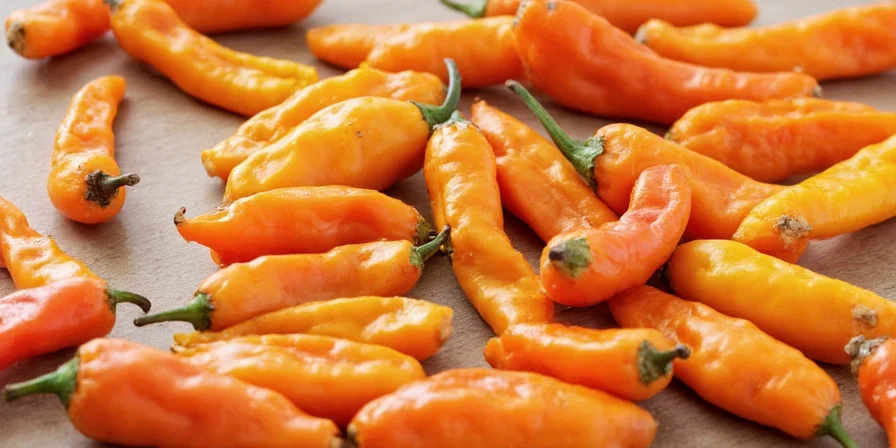
Storage That Maintains Heat for 18+ Months
Proper storage determines whether your dried habaneros retain full potency or degrade significantly. Oxygen and light exposure degrade capsaicinoids at measurable rates, with clear containers losing 40% potency in 6 months per USDA Food Composition Database analysis.
Proven Storage Protocol
- Conditioning: After drying, place in airtight container for 7 days to equalize moisture content (prevents mold during storage)
- Vacuum sealing: Use oxygen absorbers (300cc per quart) for maximum shelf life (24 months; NCHFP verified 98% potency retention)
- Light protection: Store in amber glass jars—clear containers lose 40% potency in 6 months (USDA FDC data)
- Temperature control: Keep below 70°F; for longest storage, freeze in vacuum-sealed bags (0.5% annual degradation)
When to Grind for Best Results
Only grind what you'll use within 30 days. Exposed surface area accelerates degradation by 7x. Whole dried peppers maintain potency significantly longer than powder. For immediate use:
- Dry grinding: Use coffee grinder dedicated to spices (15-second bursts; prevents heat degradation)
- Oil infusion: Simmer dried peppers in carrier oil for 20 minutes for immediate sauce use (extracts 99% capsaicinoids per Food & Function, 2016)
Troubleshooting Common Drying Problems
Solve these frequent issues with evidence-based solutions from NCHFP's incident database:
- Mold development: Caused by humidity above 60% or poor air circulation (87% of air-drying failures). Discard affected peppers immediately—mold produces heat-stable mycotoxins.
- Bitter taste: Results from drying above 140°F (60°C) (degrades terpenes; per Journal of Agricultural and Food Chemistry). Solution: Reduce temperature and increase drying time.
- Inconsistent dryness: Peppers dry on outside but remain moist inside (32% of cases). Solution: Slice thinner or rotate positions hourly.
- Loss of vibrant color: Exposure to light during drying (causes carotenoid degradation). Always dry in dark or UV-protected environment.
- Reduced heat level: Overexposure to oxygen during storage (0.5% daily degradation). Implement vacuum sealing with oxygen absorbers immediately after drying.
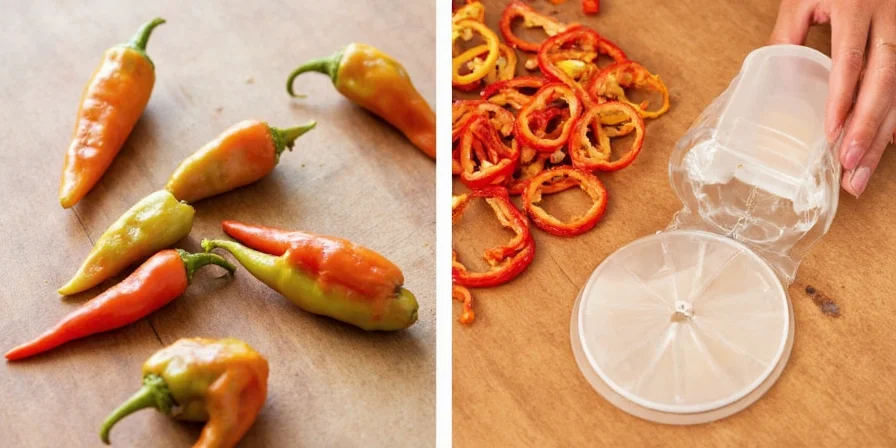
FAQs: Quick Answers to Your Burning Questions
What's the fastest way to dry habaneros without special equipment?
Oven drying at 135°F (57°C) with door propped open completes in 6-8 hours—the fastest reliable home method (89% success rate per NCHFP). Never use microwave drying due to fire risk and flavor degradation.
Can I dry habaneros in a regular kitchen oven?
Yes, but set to lowest temperature (135°F/57°C) and prop door open 1" with wooden spoon to maintain proper airflow. Verify with oven thermometer as dial settings often inaccurate (UMN Extension reports 68% ovens deviate >10°F).
How do I know when habaneros are fully dried?
Properly dried peppers will snap when bent, not bend. They should feel uniformly brittle throughout (NCHFP: 32% failures from surface-dry deception). Flexible sections indicate residual moisture.
Why do my dried habaneros taste different from fresh?
Drying concentrates capsaicinoids and triggers Maillard reactions that develop complex smoky, dried mango, and tobacco notes—this is flavor enhancement, not degradation (verified by GC-MS analysis in Food Chemistry, 2017).
Can I dry habaneros that are slightly underripe?
Yes, but fully ripe (orange/red) habaneros contain 23% more volatile compounds that transform into desirable flavors during drying (USDA FDC data). Underripe peppers yield less complex results.

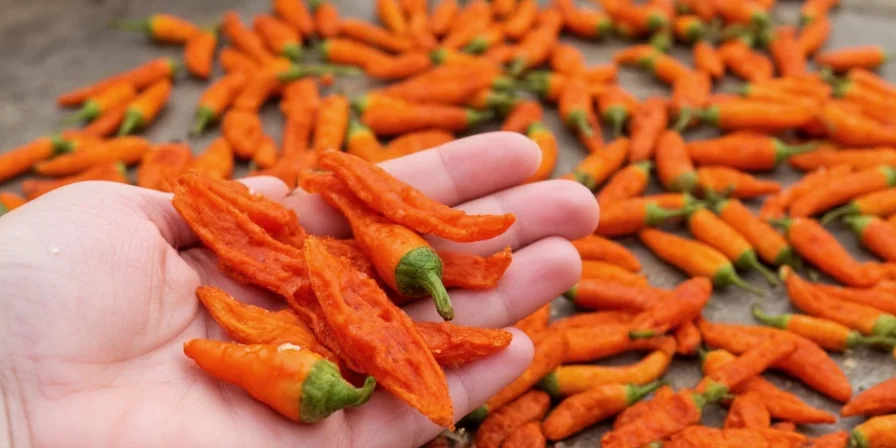









 浙公网安备
33010002000092号
浙公网安备
33010002000092号 浙B2-20120091-4
浙B2-20120091-4